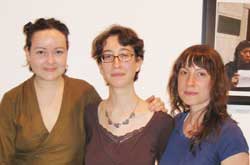If you want something done... anthropology students publish work

Isabelle Amy Legoff (left), Talia Weisz and Rachel James at La Centrale Gallery during their book launch on June 7.
photo by karen herland
Isabelle Amy Legoff was excited when her professor pronounced her essay worthy of publication in an anthology of ethnographic papers exploring communities in Montreal written by students.
Months later, Gediminas Lankauskas still had no concrete information about when, or how, Legoff’s study of Romani musicians in Montreal would be published. So last November, Legoff approached Rachel James and Talia Weisz, two other students she knew would be interested in the project, and the three undergrads entered the world of publishing.

Stories from Montreal 3: Ethnographic Accounts of Life in North America’s Francophone Metropolis was launched at La Centrale Gallery on June 7.
This is the third compilation of work done in the Anth 315 field research class. However, momentum was lost and no one has taken on the project since the second volume was published in 2002. That’s where Legoff’s initiative kicked in.
She and her co-editors started with 15 papers that had been written during the 2005-06 academic year. The trio whittled that down to 10 based on “clarity of the subject and how well the arguments were supported,” Legoff said.
The pieces investigate martial arts communities, drumming circles, religious and political subcultures, musical groups, and the revitalization of the Mohawk language at Kahnawake. These groups stretch the term ‘communities.’
“This has been an issue that has been debated in anthropology. Cultures are no longer seen as bounded, timeless entities,” Legoff said. “The essays are more concerned with specific ‘communities,’ in the sense of belonging to a group.”
In almost every case, the researcher felt some tie to the community, participating beyond the few months expected for the assignment.
The editors contacted the authors of the papers they selected and embarked on a rigorous editing process. “We worked with them throughout the year. Each piece went through four drafts,” recalled Legoff. “Since they’re 15 to 35 pages long, that’s quite a bit of work.”
The three learned how to fundraise (a number of campus and student groups financed the project) and how to organize an event. They also learned how their abilities complemented each other. “Talia was the hardest, she’s a hardass editor.”
All three agreed that taking the manuscript through the editing process into the hands of a copy editor, designer and eventually into book form, was a long and complex process.
“I had no idea what to expect. They taught me how to work with lots of different people, “ Weisz said.
The book will be available at the Co-op and Concordia Bookstores.